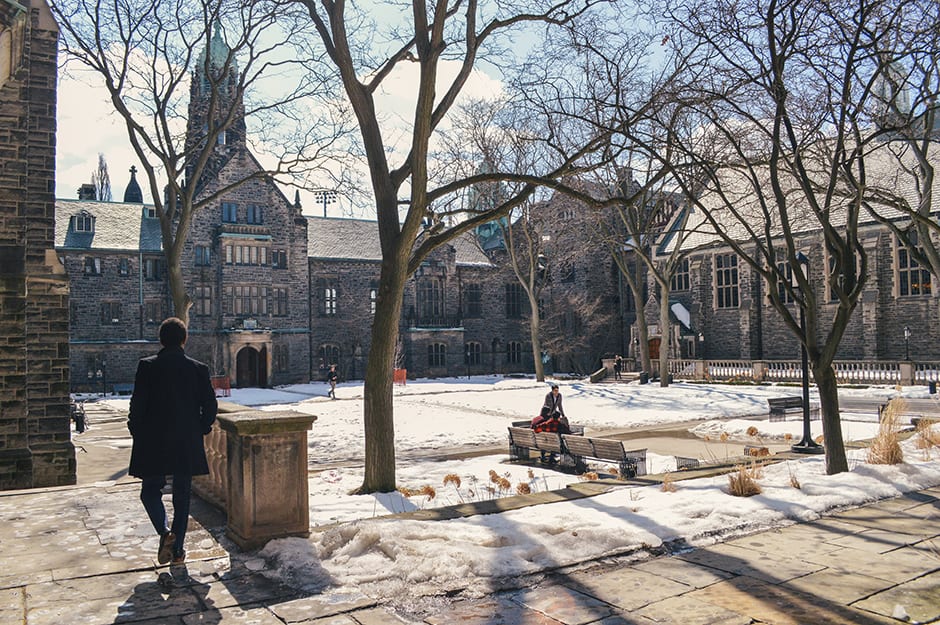The Trinity College Meeting (TCM) last Monday included discussion of several motions pertaining to equity issues, drawing a crowd of about 185 people.
On the meeting’s agenda were constitutional motions to remove gender-segregated meetings, to inscribe equity into the constitution, and to change the phrase “Men and Women of College” to “Members of College” in the document.
The latter motion was originally defeated at a TCM in October when it failed to receive the two-thirds majority needed to pass.
Motivated once again by Haley O’Shaughnessy, president of Rainbow Trinity, the motion received overwhelming support at Monday’s meeting, and was the last motion to pass before adjournment at 11:33 p.m.
The agenda also included a host of non-constitutional motions aimed at removing divisive customs and traditions at the college. These motions will be addressed at an “emergency TCM” scheduled for March 23.
Monday’s meeting was set to take place in the Buttery of the Trinity College Larkin building, but was moved to the much larger George Ignatieff Theatre due to the unexpected number of students in attendance.
“Men and Women” to “Members”
If the motion divided students at TCM the second, the same one united a cohort of Trinity members at TCM the seventh.
O’Shaughnessy moved — for the second time in six months — to remove gender-segregated language from the TCM constitution, this time to a room of supporters. They said that, as a student who does not identify within the confines of the gender binary, this show of support from the college was a huge validation of their experience as a student.
“I was prepared for people to say poor things about it. The fact that I didn’t hear that and that people were so happy that it passed really affirms all the work that has been put into this,” O’Shaughnessy said.
“That vote was saying: I think our traditions are important but I want to make sure everyone can experience the way I see these traditions,” they added.
O’Shaughnessy highlighted that, prior to the approval of the motion, the only reason they had a vote at the TCM was because they were constantly misgendered as a woman.
O’Shaughnessy also acknowledged that the motion’s success was just the symbolic beginning of addressing the greater systematic marginalization caused by gender binary structures.
They say that they look forward to the emergency TCM that will address the non-constitutional motions. “The motions that we put forward are applications of this move to eliminate the gender binary…[they] are all applications of this symbolic gesture,” O’Shaughnessy said.
Work yet to be done
O’Shaughnessy and members of the wider U of T community see Trinity College as a site requiring significant changes to become more equitable and safe.
Ben Donato-Woodger, a fourth-year University College student, left Trinity College in fourth year, saying it was an unsafe space in many ways. “The TCM needs a hard wake up call around issues of equity,” Donato-Woodger says.
Donato-Woodger attended TCM the seventh to support the work of Rainbow Trinity on the motions, adding that while he is happy that the “members of college” motion passed, it is not a sign of absolute progress.
“The members of college is great, but to be honest I think it’s a bit superficial. I think the meat of the amendments lie in the gender segregated ones,” Donato-Woodger said.
The motions to which Donato-Woodger refers are among those postponed to the emergency TCM. They include removing gender-segregation from college traditions and events, writing letters to the dean of students to propose gender-neutral washrooms and equity workshops, and endorsing the U of T Students Against Sexual Violence group.
Donato-Woodger says that, based on his own experiences at Trinity College, these motions are necessary to make Trinity a safe place. He adds that during his participation in Midnight Run in first year — an event that motion 11 would make gender-inclusive — men and women were separated and yelled sexist slurs at other colleges.
“I remember going to UC and chanting that they’re dirty because they taught sexual diversity studies,” Donato-Woodger says. Though he hasn’t participated in the event since his first year, Donato-Woodger says traditions like this one should be highly concerning, and that making them genderinclusive is a step in the right direction. “I really can’t imagine if they had boys and girls together everyone chanting that sort of stuff,” Donato-Woodger says.
O’Shaughnessy agrees that there are equity problems to be corrected at Trinity, but believes that the passage of the “members of college” motion shows that the college is ready for change. “It’s clear that these traditions have to evolve or die. It’s as simple as that. I think that Trin is calling for them to evolve,” they say.
“[These traditions are] not important enough to stay the way they are and allow the marginalization of their peers,” O’Shaughnessy add.
At TCM the seventh, motions also passed requiring the heads of college, arts and non-resident affairs to attend equity training, as well as large capital projects, including one to renovate Trinity’s washrooms and make some gender-neutral.


